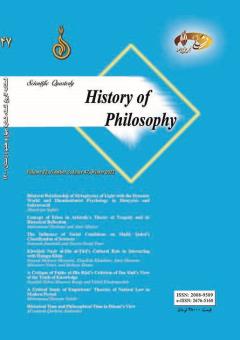Bilateral Relationship of Metaphysics of Light with the Dynamic World and Illuminationist Psychology in Dionysius and Suhrawardī
Subject Areas : Geneology of philosophical schools and Ideas
1 - Associate Professor, Payame Noor University, Tehran, Iran
Keywords: metaphysics of light, dynamic world, Illuminationist psychology, illuminated world, Dionysius, Suhrawardī,
Abstract :
The present paper basically hypothesizes that the recent Neoplatonic philosophy is entangled with Christian and Jewish traditions. Accordingly, it would be possible to match Dionysius’ thoughts with those of Illuminationist and mystic philosophers, particularly Suhrawardī, in the world of Islam. In spite of their different religious and gnostic backgrounds, both Dionysius and Suhrawardī present the same metaphysical system that is based on the mysterious concept and creative role of light. The present study, while relying on the principles of this system, focuses on the similarities between their philosophies in three respects: metaphysics, psychology, and structures that lead to explaining the theorem of the illuminated universe. The author, on the one hand, intends to explain the core of this similarity based on the creative identity of light in order to reveal the emanated identity of the world and the effusion of light. On the other hand, he wishes to demonstrate the basis of their mutual metaphysical and Illuminationist relation to cosmology and fundamental principles of psychology and intuition. Based on the three-fold similarities of these two systems, three conclusions can be derived: 1- origination of the system of the world through emanation in divinity, 2- the reliance of the dynamic structure of the world on Illuminationist action in the whole world, 3- psychology of intuition as the basis of the deiformity of the soul in the world of lights. Nevertheless, the author shows that there is an obvious difference between the two thinkers’ metaphysical systems regarding the way the soul can attain devotion and deiformity.
ایلخانی، محمد (1382) تاریخ فلسفه قرون وسطی و رنسانس، تهران: سمت.
سهروردی، شهابالدین (1367) حکمت الاشراق، ترجمه سیدجعفر سجادی، تهران: دانشگاه تهران.
مجتهدی، کریم (1375) فلسفه در قرون وسطی، تهران: امیرکبیر.
هروی، نظامالدین احمد (1363) انواریه، تحقیق و مقدمه حسین ضیایی، تهران: امیرکبیر.
Corbin, H. (1998). The voyage and the messenger: Iran and philosophy. California: Northe Atlantic Books.
Gresh, S. (1978). From Iambolichus to Eriugena, an investigation of the prihistory and evolution of the pseudo-dionysian tradition. Lieden: E. J. Brill.
Nasr, S. H. (2007). Three muslim sages: Avicena, Suhravardi, Ibn Arabi. New York: Caravan Books.
Perl, E. D. (2008). Theophany: the Neoplatonic philosophy of Dionysius the Areopagite. State Univercity of NewYork
Peters, P. E. (1967). Greek philosophical terms. New York: New York University Press.
Plotinus (1964). Enneads. ed. by P. Henry and H. R. Schwyzer. Oxford: Clarendon Press.
Proclus (1964). The slements of theology. trans. by Eric. R. Dodds. Oxford: Clareston Press.
Pseudo-Dionysius (2010). The Divine Names and Mystical Theology. trans. by J. Parker. Charleston, South Carolina: Nabu Press.
Pseudo-Dionysius & Parker, J. (1894). The Celestial and Ecclesiastical Hierarchy Dionyius. London: Skeffington and Son.


